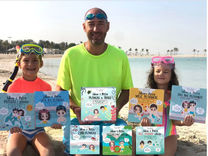When is the right time to enrol in a swim school?
- Nov 9, 2020
- 7 min read
It all depends on what the parents expect from the swim school. It also depends on the way the child has been introduced to the water and swimming. The age of the child also matters, but it is not crucial, as children and their motor skills and preferences are different.
The sooner you enrol your child in a swim school, the greater benefits you will get. From the point of view of a parent with two decades of experience with non-swimmers and children in the water, I can freely say that today is the right time for a swim school! I’ve provided some answers to the parents below regarding the right time for enrolling children in swim schools, but you should also bear in mind the fact that even before the swim school you can swim and enjoy swimming with your children!
Why should we enrol our child in a swim school?
So that your child could be “literate” for a lifetime. So that your child could learn a life skill – to swim through life both in the sea water and in the fresh water. So that your child could know when and how to jump head first or feet first into the water, how to dive under big waves when necessary, and how to rest by floating on the back when the water calms down. Why? Because swim schools teach children to be safe in and around the water, and how to behave in emergency situations in the water. They learn to breathe properly so that they could swim through life more easily.
When should we enrol in a swim school?
At the time when your child feels physically ready o be organised and have a systematic swim training. Mental and emotional maturity of your child also matters. Based on the theory, children of 4 years of age are ready for a swim school, while the practice shows us that years don’t really matter here, but the approach in the water and around it. My children for example, after baby swim lessons at the age of four months went on and “jumped” into the pool and started with a swim school when they were still under three.
There are more and more children aged 3-4 years who are much readier for swim schools than some six-year-old non-swimmers, especially if they had some experience with baby swim lessons before. There are no strict rules here. This is why a child enrolling in a swim school, who hasn’t got any experience with swimming, should be given some time to splash in the water first and time to adjust. Why? Because if you want the swim school to be something your child enjoys very much, and not another task on your child’s to-do list, then this is the way to go. This refers not only to the coaches but also to the parents. With their partnership, the results of swim lessons are much better. Because parents are those who show the interest for a swim school, a child shows willingness, while the professionals are there to assess, give recommendations and make decisions about whether the child is ready for swimming today or not.
What are the advantages of learning how to swim at a very early age?
Swimming is the only sport which your four-month-old child can enjoy, as well as the entire family. Swim lessons at the earliest age minimize the potential risk of drowning up to 50%. Apart from the physical health benefits, being a foundation of proper development, motor skills and coordination in children, swimming will contribute to the preservation and development of mental health as well. Science shows that swimming children are much more progressive than their non-
swimming preschool friends.
How many times a week should children swim and go to a swim school?
This is a never-ending “fight” between parents and coaches. Why? Because every coach will say that if you want your child to master the basics of swimming, feel safe in the water and around it, and if your child is a beginner, then he or she should swim 2 to 3 times a week continually. Just to make it clear here. Half an hour of swimming once a week is not enough for your child, you’re just wasting your time and money, and it won’t be effective and you’ll need plenty of time to make your dream come true, which is to have your child feel fully safe in the water and around it.
I can say what parents are thinking just by looking at their expressions while being told this. I agree with you. Swimming twice or three times a week may be quite expensive for you. Also, it is easy for me to understand that you need time to be able to physically manage to drive your child to the swim school and back three times a week, in summer or when it’s cold and rainy, in addition to all other things you and your child need to do on daily basis...
It sounds crazy, right?! Well, it’s not, if you accept the fact that swimming is not just another summer activity, but a life skill every child should master as soon as possible.
Can children who take up swimming before they turn four get the feeling of false safety in the water?
Children can get that false feeling in the water anytime. It definitely has nothing to do with their attending baby swim lessons before they start with the swim school. It is quite irrelevant whether the children are under or over four years of age.
For example, even if children had attended baby swim lessons as very young, and then started to go to a swim school when they turned 3, I would never leave them in the pool all on their own. Water can be tricky and children can get relaxed quite easily when carried away by the play. They feel free when they are swimming and diving, while still being unaware of their skills in the water. Despite being able to swim and float in the water, beginners should always be carefully supervised and be at our arm’s reach. This is what skilful coaches serve for, and parents are also there to “control” the child in the water… They should not be “fearful” while in the water of course, but they should be cautious.
Security and safety of children in the water is priceless.
Is it wrong to withdraw your child from a swim school if after a couple of swim lessons he or she still doesn’t like swimming?
It depends! What makes your child “not like” swimming? Is it the cold water, the instructor who doesn’t seem friendly enough or is it because a friend has splashed some water into his/her eyes, or the child simply doesn’t feel like swimming, but playing football instead, or he just wanted to wear blue goggles instead of the red ones… What matters here is that we should build a good relationship between the child and swimming at the very beginning. Don’t force it. We need to tackle that I-don’t-like-swimming situation first.
If the reason is not justified and serious, and it’s just the child’s “I don’t like it” attitude, a skilful coach can easily solve this with a full support of a parent. In those situations, giving up and withdrawing the child from the school is not an option.
Children should be encouraged to swim, that’s the first thing we need to work on.
What gives good results with non-swimmers and beginners in the swim school is laughing a lot and having fun in the water. So, children and adults need time to get used to the new setting, deep water, other people, the coach who might look strict… A lot of patience is required on both sides so that the future swimmer could grow.
This is why you should not give up on swimming easily.
When can children go to school without having their parents going with them?
The optimal time for children to attend swimming without having their parents around is once they feel they’re not so bonded to their mum and dad anymore. Once they can spend 30 minutes in the water without having their parents around, and be focused enough to listen to their coach during the lesson. That can be the time when they’re three or four, while some children need to be over five or so. But remember, it’s never too late to attend a swim school. Every child should
have their own pace.
When will my child learn how to swim?
It is hard to give an accurate answer to this question as every child is unique and thus their learning how to swim is different from somebody else’s. Some children learn how to swim, or float at the age of two, while some do that at the age of twenty-two, while some other people get into the water at the age of 52 for the first time. If you want your three-year-old child to learn how to swim properly, that process will take up to one year of continuous trainings. The goal of pre-school child swim lessons is to have it all look like just having fun in the water, as this approach can make your child become independent and safe in the water. Parents should know that swimming requires commitment and patience.
Will my child forget how to swim by next summer, if we don’t take him/her to swimming during winter?
First of all, it depends on the swimming level the child was in the swim school this summer. If your child is a beginner and hasn’t mastered swimming during summer months, it is unlikely for him/her to keep that level until next summer. But if the child is at a higher level, and doesn’t swim during winter, he/she will not forget how to swim by the next summer. He or she might fall out of shape (though they played football during winter), downgrade their techniques and their previous level of swimming.
How to choose a good swim school for my child?
A good swim school is the one preparing swimmers not only for the water but also for life. It is hard to be a quality school without having professional and experienced staff. Educated swim coaches are often psychologists and pedagogists at the same time… they are the factor which makes a school “a renowned one”. Are such a school and its curriculum good for your child? That can be easily checked. There are always those lessons which your child can attend just to see whether it is OK for it or not, and discuss it with parents, and test the child’s level.
Testing in swimming before starting with swimming is used to identify the child’s level… The knowledge and age here have a crucial role for the selection of which group the child will join: beginners, intermediate, advanced or competitors. Each of these groups has its own subgroups too.
No matter when and which school your child goes to, the crucial thing for your child is to learn how to swim, feel safe in the water and around it!





































































Comments